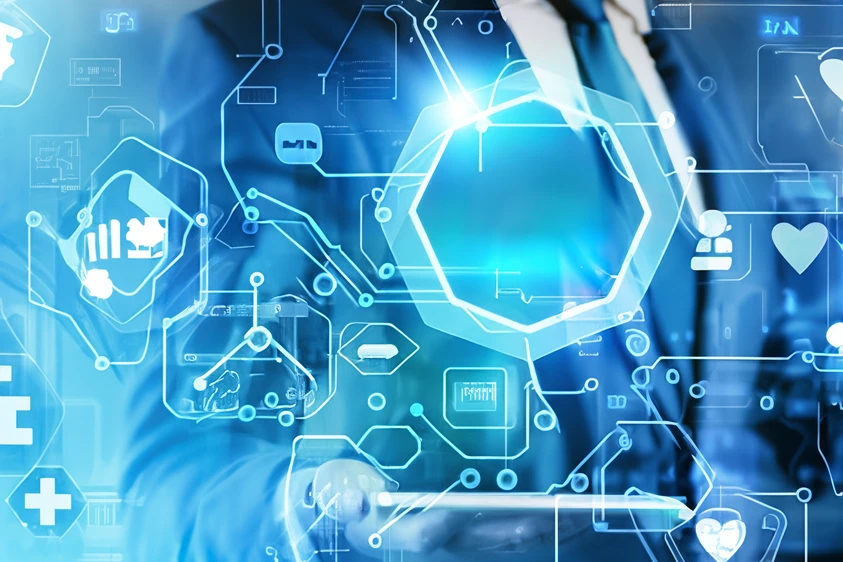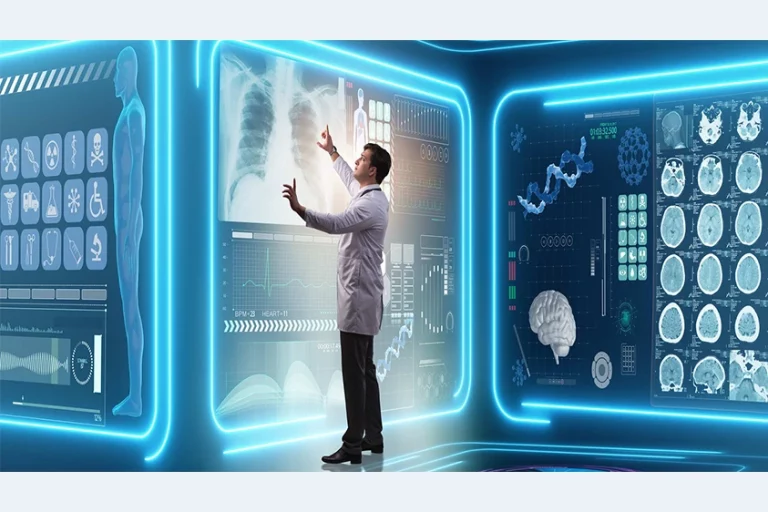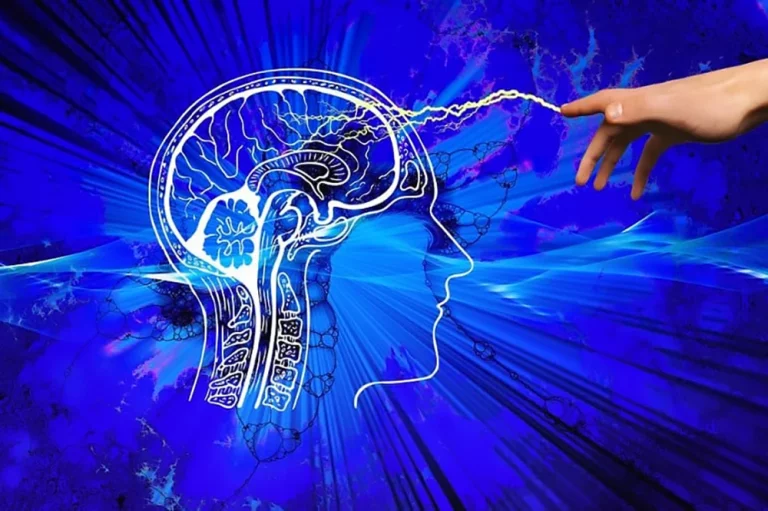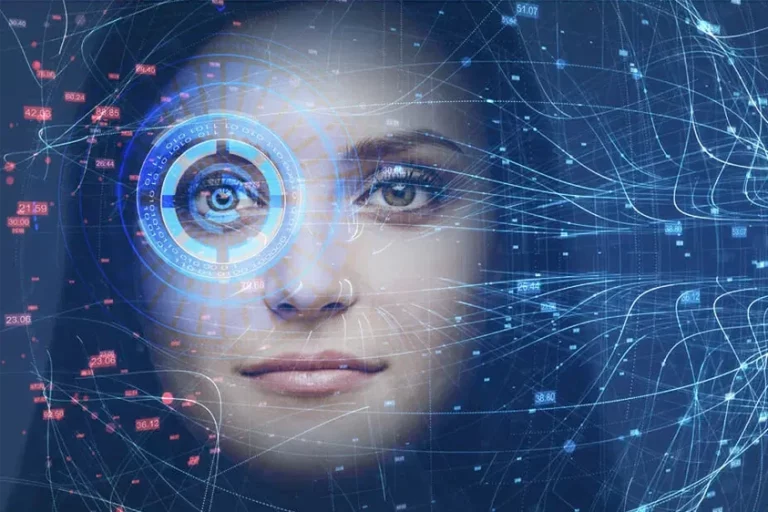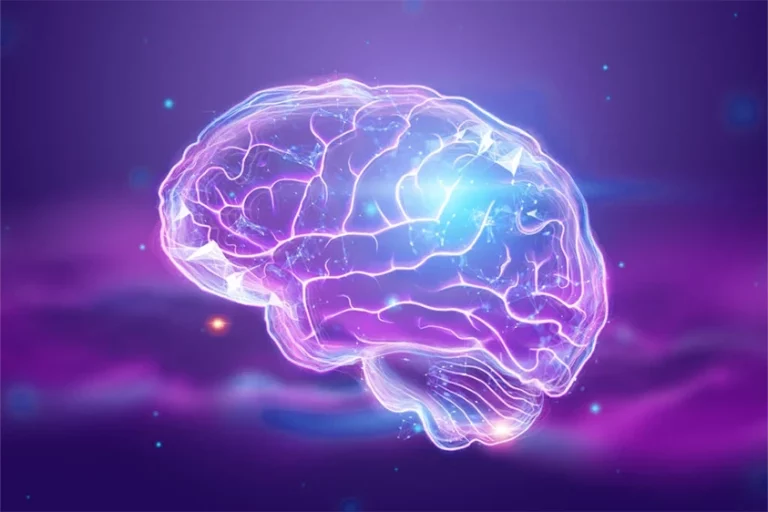Artificial Intelligence Revolutionizing Healthcare: Key Innovations and Impact
The healthcare sector is experiencing a change now, with the coming of an AI wave already providing the industry with an array of opportunities to treat every patient better and, at the same time, make the whole process of medical workflow more efficient. AI has built in technology such as machine learning and natural language processing, which are being used in various areas of healthcare services. Robotic technology developed to analyze data, provide insights, and elevate doctors’s decision-making processes is completely reshaping the manner in which medical professionals are diagnosing, treating, and constantly monitoring patients health.
Introducing AI in medical care outcomes will improve not only patients’s wellbeing but also that of healthcare professionals. The application of health tools embedded with AI technology has contributed to the ability of people to make informed choices regarding their well-being and consequently to attain desired results. From diagnosis to treatment in the background information, AI is one of the most important components for improving patient experiences and outcomes through data analysis.
Providers of healthcare who accept the adoption of AI will be able to both improve efficiency and pay attention to the factto the fact that the patient will be given much-needed care. The future AI deployment in healthcare will be marked not only by precision medicine and telehealth services but also by the work that will be stuck on to redefine the process of healthcare delivery of healthcare.
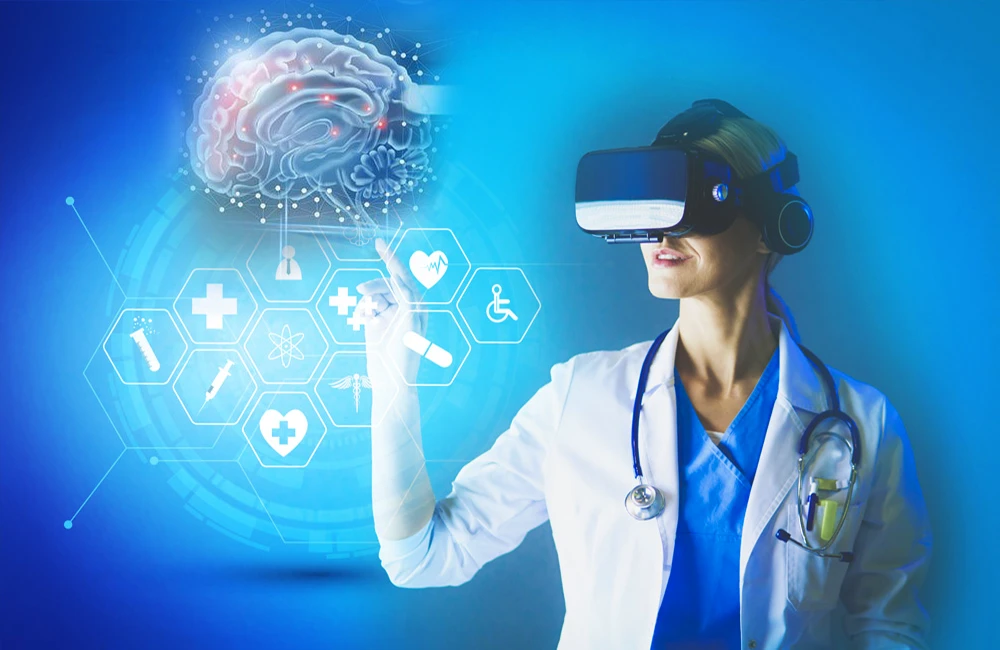
The Concept of Artificial Intelligence in Healthcare
The scope of healthcare is fast changing due to AI, which is now being incorporated into it. The term AI is used in this case to mean the imitating of the mind by machines in performing functions that could be only performed by humans, such as problem solving, learning, and recognizing patterns. Healthcare systems can make use of machine learning, deep learning, and algorithms in order not only to monitor patients on a daily basis but also to enhance health outcomes and therefore healthcare
AI has a subset called machine learning, which is concerned with providing systems with the ability to learn new things by examining data and improving on their own. In a healthcare context, this can include predicting the outcomes of individuals, identifying risky health factors, and eventually making recommendations based on the real-time data of the patients. Deep learning happens to be a branch of machine learning that takes neural networks constructed in similar software to the structure of the human brain and allows more intricate outcomes to be achieved.
A popular type of deep learning algorithm called a classifier is implemented by giving data sets that are labeled. Such data is often composed of pairs that depict the patient’s data on the first side, while on the other side there is the prediction or the desired outcome. Through this, the algorithm will get better at realizing original associations between data and patient outcome parameters and will perform very similarly to human clinicians whenever it needs to make some decisions.
By being utilized appropriately, AI is capable of permanently changing healthcare in numerous associated aspects. For illustration, AI has the ability to assist in diagnostics by analyzing data and finding patterns that help in discovering the presence of a specific disease or medical condition. Another aspect of AI in healthcare is the use of algorithms to find applications and develop treatments by exploring the existing information resources and looking into the details of patient data in order to discover unique relationships and novel ideas.
Moreover, AI can optimize the effect of care by creating personal treatment plans that reflect the patient’s health data and existing situation. This makes signifiers like healthcare providers very knowledgeable and able to make choices as regards resource allocations, resulting in good patient outcomes.
AI is indisputably among the most significant forces of change in healthcare. These techniques include machine learning, deep learning, networks, and neural networks, respectively. Holds a definite capability to transform the nature of care and, importantly, lets patients and practitioners receive greater benefits. Throughout the learning process and as you get deeper into the challenge of AI in healthcare, you will find the need to ensure that you have the know-how and confidence in the application of AI technology to create an efficient and healthy care delivery system.

AI and Patient Care
AI and Personalized Medicine
The medical field is anticipating a change through the introduction of artificial intelligence because of the ongoing implementation of this advanced technology in the healthcare of patients. Through analysis of the data generated, AI technology can detect what works best and suggest the most appropriate treatment that matches the specific requirements of each patient. Such information aids in treatment coordination and allows for personalized therapy throughout the patient’s whole recovery period.
AI in Triage and Symptom Checkers
AI-powered symptom checkups and triage tools are also really changing the way patients take care of their health issues. Such apps help in that they enable users to key in their symptoms and give instructions aimed at enabling patients to determine when self-management approaches can be deployed, when immediate medical services are needed, and also when it is necessary to book an appointment with a medical professional. It not only elevates healthcare services for patients but also allows medical services to withstand the strain caused by overcrowding.
AI and Diabetic Retinopathy
In the context of retinopathy, which is the most common diabetes complication that can be associated with the loss of vision if it’s not captured and treated timely, AI technology plays a pivotal role. It hastens the diagnosis process by scrutinizing the scans and highlighting signs of diabetic retinopathy. Thus, such diagnosis and timely therapy will give the patients the potential to slow the progress of their disease, according to which they can preserve their eyesight for a longer period of time.
AI and Clinical Trials
Moreover, AI during the trial process has manifested the capability of patient drug matching through their analyzed medical data. With the ability to refer patients to ongoing clinical trials, patients can participate in cutting-edge treatments that may change their lives for the better. Additionally, they can have peace of mind knowing that they contributed to the field of research. As well as this, AI reduces the time for the examination of data in trials; one of the possibilities of success is discoveries and speeding up access to new treatments on the market.
AI’s impact on Dermatology
Nowadays, AI is totally transforming the science of dermatology, thus practicing proper identification of skin lesions and diagnosis. By using AI-enabled picture analysis, dermatologists can accurately identify and avoid skin cancers. If there is a skin problem identified, patients should receive immediate and correct treatment.
AI’s role in Ophthalmology
AI applications in the field of ophthalmology with a focus on eye use can be greatly beneficial. Through this process, AI algorithms distinguish various patterns in the data. Acquire know-how about different types of eye diseases. The upshot in this connection is early diagnosis and prognosis, as well as the aid of eye care for the sake of limited vision abnormalities.
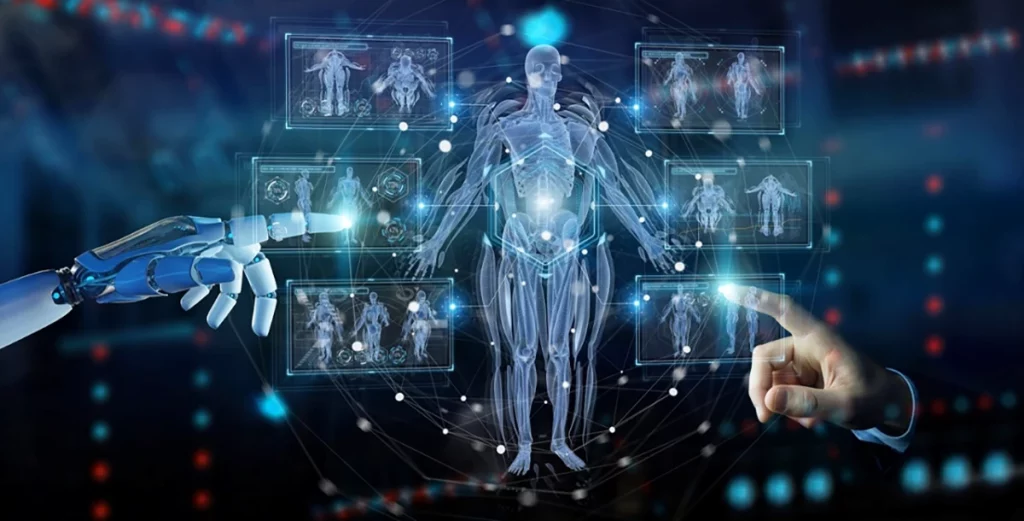
AI’s contribution to Medical Diagnostics
Harnessing Image Analysis through AI
AI is bringing a great change in diagnostics through its skills to fill in and interpret data sets, including medical images. AI’s are machine-learning and network-oriented, which means that they can detect patterns and abnormalities in medical imaging that are not easily seen by human eyes. It may help not only to increase the accuracy and mode of diagnosis but also to supply data and knowledge to the doctors.
For one, AI can be useful in carrying out imaging analyses such as X-rays, CT scans, and MRIs. Thus, the disease process can be accurately localized, e.g., extirpation of tumors, fracture repair, or lung nodule detection. The takeover of AI in image analysis does not reduce duration. Eliminates some jobs while strongly facilitating early diagnosis and treatment, which eventually leads to better results for the patients.
AI’s influence on colonoscopy is captivating too. Colonoscopy is an exam for identifying polyps and neoplastic lesions in the large intestine and rectum. Traditionally, its effectiveness was determined by professionals and physicians, which leaves space for interpretation and, consequently, the misdiagnosis of the findings. Nevertheless, with the help of the AI, processing and interpretation of the colonoscopy images in real time can now be accomplished. It highlights the regions of difficulty for which the human eye may not be able to perceive clearly.
Using AI-driven technology in colonoscopy processes, we can achieve higher precision levels with a concurrent decrease in missed identifications. Additionally, AI can be used by experienced surgeons as a guiding tool that will also accelerate their growth and develop new skills. The significance of AI in health system performance.
AI and Electronic Health Records
The AI revolution certainly causes a buzz around health records (EHRs) as it eases the data input, retrieval, and analysis process. The automation of these responsibilities will help healthcare facilities save time, smooth their workflow, and reduce errors. AI comes with language processing and machine learning algorithms that are able to spot patterns in the data, provide needed insights, and support the decision-making process.
Some examples of what AI can do include:
- collecting data from notes and patient retellings in a summarized way.
- Having written advice on how to remove burdens from personnel.
- Identifying. Anomaly detection in data to make early detection of diseases possible.
Also, through using AI technology for controlling the EHRs, the productivity of employees would be enhanced by the reduction of labor. This frees up your team to hone in on areas in which they have the most expertise.
AI’s Impact on Patient Outcomes
AI has a chance to radically redesign patient care and could help with the general improvement of results. After utilizing analytics and machine learning techniques, AI can develop treatment plans in accordance with a patient’s specific attributes and medical history. The excellent accuracy of a diagnostic process is the key element in providing each patient with the most appropriate treatment.
Some advantages of AI, in outcomes include:
- Discovery and treatment sooner result in better results and lower healthcare costs.
- A prediction of response to several treatment options will be done to make the proper selection of the therapy or intervention.
- Constant supervision of patients allows healthcare providers to make the right decisions and alter or adapt treatment protocols as needed.
Humanizing care with the help of AI can do a great job in all care sectors, which will result in better patient care outcomes. With a fusion of expertise and AI technologies implemented, you will make a step forward in the improvements healthcare is experiencing nowadays and significantly raise the quality of healthcare provided to your patients.

AI and Precision Medicine
The new frontier of healthcare involves applying the capabilities of AI and precision medicine. According to precision medicine, treatments should be tailored to individuals according to their genetic profile, lifestyles, and the environment around them. AI potentially enables high-accuracy medicine through a dataset and complicated- algorithmic discovery of patterns and correlations that are difficult to identify in humans.
In the area of diagnostics, AI systems can operate in conjunction with radiologists in order to detect diseases by means of imaging techniques like radiology scans and pathology slides. This enables the sensors to detect diseases both accurately and precisely, resulting in earlier diagnosis and, therefore, better health outcomes.
Furthermore, AI algorithms can also use large datasets to sift out the genetic changes that correlate to specific diseases. This offers a chance to create personified therapies that are not just good for the treatment of patients and clinicians but also to help patients have control over their health. The patients can get information reports by utilizing AI technology. Specific health recommendations are aligned to a person’s unique gene profile. This contributes to the development of programs for early care and reactive disease management.
Besides, AI also performs functions in the development of successful drug therapies. AI detection of genetic abnormalities on the cell level and identification of biomarkers support the identification of new medications as well as provide opportunities for repurposing existing ones. Such a targeted and personalized process of drug design gives patients an excellent opportunity to use those medications that would be ideal for their needs.
With the purpose of summarizing, the integration of AI and precision medicine going forward contributes to the development of diagnostics and treatment for patients. Ultimately improves outcomes. Since progress is made in this area every single minute and hour, it is important to keep informed about the innovations in technology. This will provide you with an opportunity to systematically evaluate your medical course and willingly commit to AI-inclusive personalized medicine.
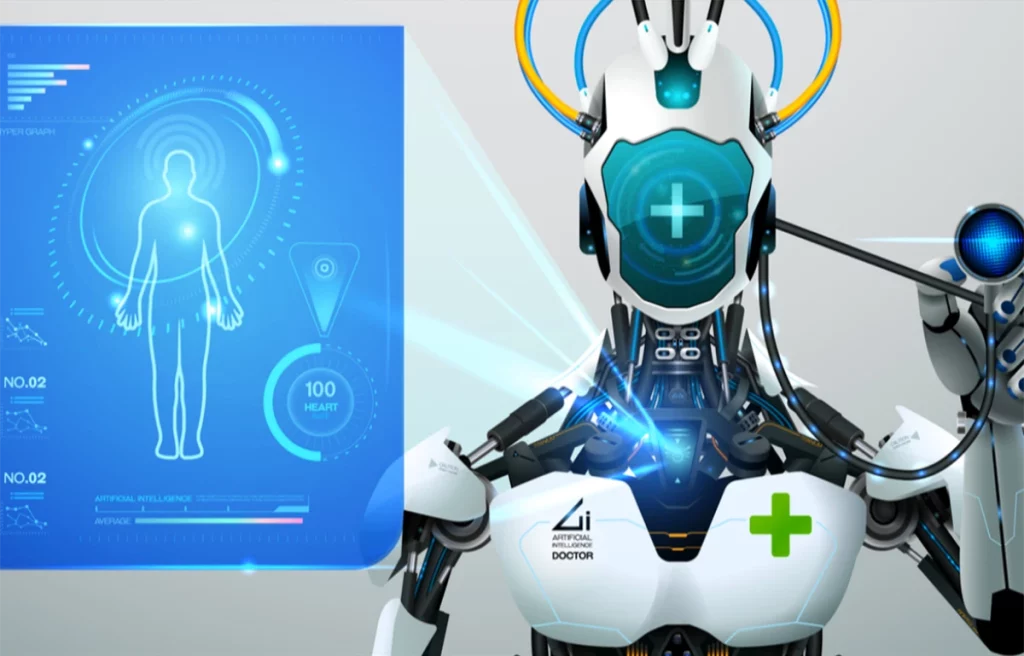
The Innovations and Application of AI in Healthcare
Artificial intelligence technology is accelerating, bringing about healthcare changes at an unprecedented pace. Being a healthcare specialist, it is an obligation to know how AI revolutionizes operations and treatment, in effect producing a better patient’s outcome. The utilization of AI in imaging constitutes one of the main achievements in healthcare. Thousands of lung cancer scans would be examined through AI algorithms that eventually accumulated experience from the cases. This highly advanced technology allows the identification and precise localization of potential health problems.
AI has brought innovations to the healthcare sector including:
- Analysis of images
- Assistance with documentation
- Patient automation of devices
- Personalized treatment recommendations
Through AI technology, administrative workflows may be improved. The documentation of tasks can be delegated to machines. This saves time for doctors and other healthcare workers to concentrate on the delivery of good-quality care to patients. Other than that, AI enhances patient outreach as it keeps communication between patients and the healthcare provider constant and timely.
AI-based tools are gaining more and more specificity. Delineate improvements in visual examination, smart device automation, and vital sign monitoring. Exploiting these tools enables the generation of timely information and insights that are useful in the diagnosis and optimization of therapies for patients.
One of the most effective demonstrations indicating the strength of AI in healthcare is AI. This highly innovative technology supplements thinking by using data-based analysis to boost patient care.
To wrap it up, AI advancements are unavoidable, so it’s better to keep yourself up to date and integrate these technologies into your practice with a tactic to improve accuracy in diagnosis, treatment, and monitoring your patients. Utilizing AI technology in healthcare is crucial for better results, and the healthcare system as a whole will be improved.

AI and the Advancement of Vaccines
Artificial intelligence (AI) has been escalating in healthcare while being particularly efficient in vaccine development. As a health care provider, you might be interested in the role that AI can play in the development of new vaccines, which can bring about a positive change.
One way in which AI is revolutionizing vaccines is through its ability to simulate the system. It gives scientists a basis for constructing models that can discover new targets for vaccines. Such technology does a huge favor in the vaccine design process. Can significantly shorten the period of time for new vaccine development. In addition to this, AI has the capability of carrying out complex analysis quickly on large data sets, making it possible for it to detect patterns or trends that may not immediately be picked by experts.
The application of technology in AI includes diagnostics, which contributes to improving diagnostics. AI can process huge amounts of information and is therefore a useful tool in complex conditions where there are usually several diagnostic tests done that might leave patients with ambiguous results. With the AI assistant, doctors can pick up patients at much higher risk. Implement niche-specific approaches that would not have been otherwise doable.
With the rise of COVID-19, AI showed its capability in forecasting, detecting, and thwarting the further spread of diseases. The possibilities of AI in preventing health crises are very sound, as it can predict danger, locate regions of high risk so that appropriate measures are taken, and play a role in vaccine development.
In addition, AI integration with high-throughput vaccine protein production and analysis results in a decisive shortening of the developmental process for vaccines. This novel addressing technique resolves issues that are a usual problem during vaccine development, such as the right size and speed to produce them.
To conclude, AI is not only a valuable resource in vaccines but a possible way to save lives and ensure the well-being of the global community from the upcoming prospective health beans. Suggested Adjustment: Through this method, you have the opportunity to take part in the health care transformation revolution. Create a worthwhile impact on the profession of medicine.
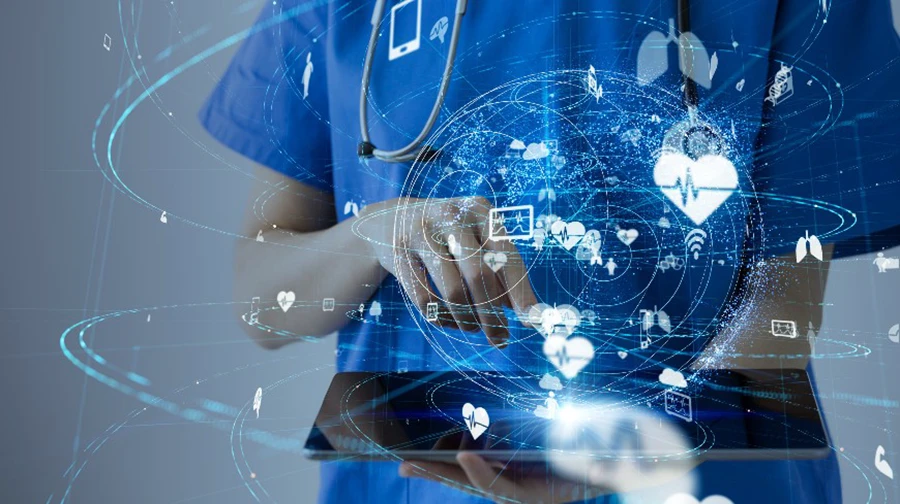
The Impact of AI on Europe’s Healthcare System
AI applications in Europe’s health sector in recent years have empowered us by offering us data analysis tools, improving diagnostics, and developing treatment plans. Taking into account the importance of AI in healthcare, European countries are working to provide the tools that would help in the adoption and integration of AI within the healthcare systems of EU countries.
Resorting to the issue of AI in healthcare, one of the most significant advancements has been in image analysis and disease modeling. Through the use of CT data processing techniques, AI will help doctors diagnose patients faster and more reliably. This improvement allows medical staff to diagnostically identify and treat a variety of diseases.
Besides evaluating patients, AI allows healthcare providers to obtain data for informed decision-making. AI plays an important role in making it possible to dig through a huge number of sets of data and find out special patterns that, up until recently, were not available even with the most sophisticated data analysis methods.
Moreover, AI can be of substantial assistance to telemedicine, one of the major components dealing with the issue of making health care accessible to any person from any location. AI is the tool that helps healthcare practitioners perform critical functions of monitoring and evaluation very quickly. Consequently, this facilitates setting appointments for the patients. Improved contact with the hospitals that have the specialists.
To make sure that the AI systems will reach ethical standards, WHO and other international organizations have created rules that indicate the need to involve human rights and ethics in all phases of the development, application, and utilization of AI systems. European health systems are expected to use these guidelines for continuous improvement in AI in order to realize maximum benefits and eliminate any hazards inherent to AI.
Through and through, AI is widely recognized as a transformative tool in Europe’s healthcare systems. Through the responsible and purposeful ascension of AI technology, one can expect that it will continually advance and provide even more human care services combined with medical treatments for patients.
AI and Deep Learning, in Healthcare
Nowadays, you would hardly attest to an area of work in healthcare that artificial intelligence (AI) hasn’t insidiously been able to invade. One of the AI technologies is deep learning, which has the potential to transform diagnosis, drug management programs, and patient care.
AI is a collection of technologies, and these algorithms are an example of the subset of AI that employs networks to discover and work with data sets that are rather complex. Such algorithms excel at finding the connection and movement in given sets of numbers; moreover, this characteristic makes them very useful in the field of health care. The information system that makes deep learning models can be like electronic health records, imaging data, and genetic information, which in turn raises a speedy judgment. This leads to medicine. Supports clinical decision-making.
Deep learning is making significant leaps in the area of diagnostics only by improving the speed and accuracy of medical images’ analysis. For example, deep learning algorithms that can identify abnormal conditions with high precision radiology have greatly profited. This also helps healthcare personnel make decisions based on solid evidence. It later advances patient care.
Other than this, intelligence systems involving learning models are being incorporated in order to find trends and implement early interventions. Achieving such a level of accuracy is possible because of the analysis of data covering information on genes, lifestyles, and medical histories. As a result, predictive models can determine the conditional development process. Not only can they help locate the most suitable treatment for each patient, but they can apply it successfully as well. With that in mind, there’s a chance that care quality will increase as the application of health care resources is optimized.
In the end, infusing AI and deep learning technologies into the healthcare fraternity is an opportunity for increased effectiveness and accuracy of diagnostic tools for professionals like you to achieve better therapy planning and healthcare overall for patients. The adoption of innovation positively contributes to the delivery of healthcare services to your patients and, at the same time, helps you address the challenges and the constant evolution of the health sector.
Wearable Technology
The implementation of AI and wearable innovations is making the healthcare sector more amazing for both patients and medical doctors. Through their capacity to be smart, wearables are becoming intelligent, focusing on the situation, and capable of analyzing real-time health data.
With AI-driven wearables, you could keep an eye on parameters, including heart rate, blood pressure, body temperature, and sleep patterns, among others. With the tracking of uninterrupted data, the AI algorithms can detect the early symptoms of health problems and immediately notify the patient. Healing begins with a preventive approach that may result in intervention, and health is improved in the process.
In addition to that, AI takes wearables even further by integrating them with telehealth networks. Such systems enable consultations for the provision of medical advice to patients through video or telephone consultation with doctors without the need to visit a clinic physically.
AI technology lets doctors have treatment plans based on data analysis provided by devices they use.
Along with AI, wearables are able to not only increase the quality of care but also aid clinical decision-making and provide patients with an outlook on a global scale. Artificial intelligence is capable of extracting patterns and trends from extensive information sets, thus providing the means for developing prevention procedures, monitoring chronic diseases, and operating health care systems. The increasing integration of AI technology in the healthcare sector will lead to a greater extent to the use of wearables to assist in monitoring and maintaining our wellbeing.
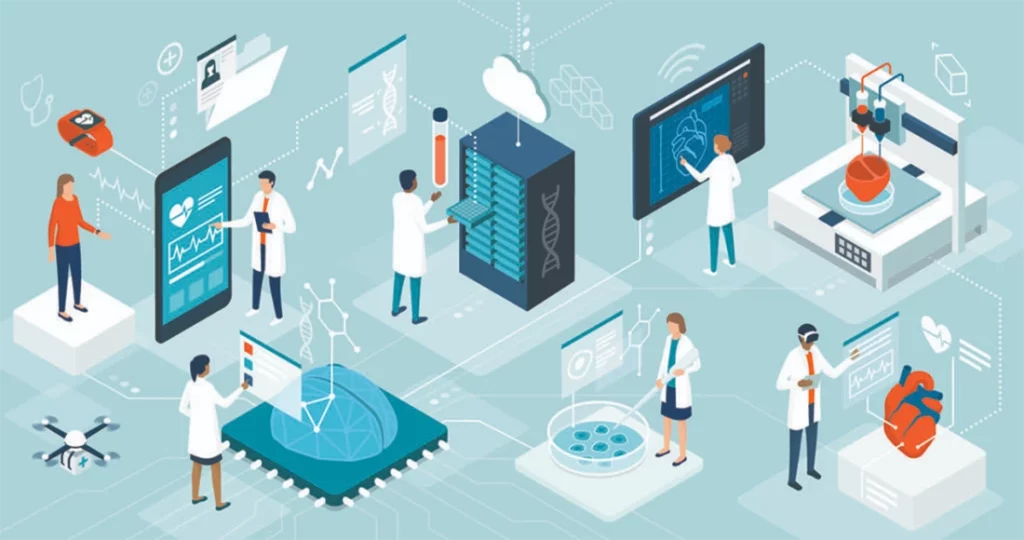
The Influence of AI on Big Data in Healthcare
In healthcare, artificial intelligence (AI) especially comes into play in processing and analyzing the enormous amounts of data commonly referred to as big data. In the following part, the impact of artificial intelligence on data in healthcare is considered.
AI systems will be able to improve the accuracy of diagnosis as well as predict the outcome. Through the analysis of all-encompassing sets of data, AI can help improve the quality and speed of patient diagnoses. For instance, automated radiology image interpretation by AI that has been trained using scans for lung cancer. This process helps AI to improve its profound knowledge, consequently achieving higher diagnostic accuracy (Harvard Gazette).
Also, the AI has the capacity to personalize treatment and create prognostic predictions for travelers based on their symptoms and genetic traits. Such an approach could possibly have the potential to design personal prescriptions for the patients, which will in turn result in more efficacious care being administered to the patients and good health.
While AI could be beneficial in the healthcare setting, this would still be a case of fears and problems. Further given is corruptedness, the overweighting we have in our views of others and vice versa. AI systems can learn through analyzing data; nonetheless, they might face some issues related to the non-representation of the data, which then leads to skewed results. Particularly, AI is a technology that should be reviewed and discussed prior to going ahead to use it in healthcare services (the risks of AI with big data).
AI healthcare data usage is not only influential but also daunting as well. AI holds the power to remake the way patients live and fulfill their requirements through perusing huge amounts of data with the aim of better results. On the other hand, however, we should admit that we have to deal with those problems and moral issues that arise during work with AI tools and data management before agreeing to AI in the healthcare system.
AI’s Role in Reducing Medical Errors
AI as a “remedy” that offers many cost-cutting solutions, including reducing errors in the medical field and a complete new organizational structure in healthcare, is one of the important aspects of approaching healthcare reform. The issue of medical errors within the health industry lies in the risk of undesirable results for patients. Also, it is not beneficial for the healthcare organization because it increases costs and can damage its reputation.
In this sense, A.I. uses error detection that ensures not to commit any mistakes through upgrades. Doctors can monitor the symptoms and decide treatment options that help them make better decisions regarding their older patients’ health. The most distinguished effect is undoubtedly the ability of AI to further add to the imaging interpretation, allowing the detection of anomalies that otherwise may remain unseen or be interpreted as something else.
It is not only limited to diagnostics; AI is also much more; it helps to reduce the errors that a human being makes when giving drugs. Through the use of AI systems that dig in big data sets, the whole system of drug/treatment interactions or side effects being possible can be rejected with ease, then given advice to the physicians and prescribed to their patients that easily.
Also, AI has these qualities that can be used to recognize errors in healthcare. Through automating activities like data entry, AI could avoid an entry error, which can be typical. Hence, this method not only makes the data more accurate, but it also leaves the providers with extra resources for doing direct patient work. Possibly, this AI implementation in healthcare could be realized only through the process of considering ethical and human rights principles throughout the whole development of AI technologies and their introduction. Through compliance with them, AI could very likely achieve an increase in reliability and render healthcare much better.
Risks to patient safety and security will be addressed in this chapter through an examination of the integration of artificial intelligence (AI) into health care. Specifically, we will discuss the issue of AI and the topic of regulation, as well as the dependency of AI on errors.
Artificial Intelligence Impact on Errors
Although AI used in healthcare to gain efficiency in tasks has its benefits and ease, there are still risks that accompany the whole process. There is a problem, and we can think of injuries from AI errors as one of the problems. Particularly, it should be advised that such systems depend heavily on the data they have been trained on. While providing them to the AI systems, the data has to be recognized. In some cases, there may be situations in which the AI makes a mistake or becomes even more dangerous because of the lack of inclusiveness displayed in the training data (source).
To tackle this problem, we need to collect data related to the use of AI systems besides the real-world experiences it affords to use as benchmarks to update the safety measures in the clinical setting (source). This approach can be a key factor in the error decrease related to AI and also in a consequently safer healthcare sector.
AI and Regulation
The health care AI technology that is spearheading the expansion of AI at a very fast speed is also challenging at the same time. Since AI systems call for the development and implementation of a robust and flexible system that accommodates the emerging features of the technology without endangering safety and efficacy, an approach that incorporates key points including but not limited to the comprehensive strategy of the system, adaptability, and transparency is preferred.
An effective path to resolving this challenge is to initiate partnerships and collaboration among AI developers, health care service providers, regulatory agencies, and other participants. Through a communications network and combined efforts, this group as a whole can liaise to build guidelines, develop performance standards for AI systems, and oversee their security and effectiveness constantly during the period of the roll-out of AI systems in healthcare facilities (source).
You may read more about these steps in order to keep abreast of the risks inherent in AI in healthcare. In addition, it will arm you with a lot of information that you can utilize at any time when you are trying to add AI systems to your healthcare service in order to maintain a safe and healthy environment for your patients.

AI and NLP in Healthcare
Artificial intelligence and natural language processing (NLP) are the two things that have made an impact on health, taking it to the next level. NLP, or the area of AI that studies natural languages and processes represented by users in speech or writing, seems to be one of the areas that offers significant promise. Thus, this technology has already been turned into a powerful tool that you, along with each of the others, might use during your career in healthcare.
Due to NLP, now you can get clues from great numbers of notes that belong to the patients, and as a result, you can make the diagnosing process easier and take effective clinical decisions on the basis of the found signals. For instance, by leveraging AI-powered NLP, you could assess information from clinical reports, electronic health records, and research publications. This wealth of information grants healthcare practitioners, which helps to improve the overall results and provokes the development of therapy methods.
Many other NLP tools, unlike humans, are not subject to a limited availability of time when performing the extraction and analysis of information from various records. It implies that you will not again lose time. Let us be attentive to selecting the best approach for our patients. Besides that, AI technology and NLP help to spot the hallmarks of symptoms and track prognosis. Further issues may be caught during the treatment. Utilization of these concepts brings noteworthy results and eventually supports the attitude of action at the prevention stage.
Although AI in the health sector is primarily demonstrated in the NLP area, the list of its applications is not limited by that. For example, AI has been explored in the health field for efficiently diagnosing and managing diseases, particularly kidney disease. Upscaling the analysis of patients™ data by 2023.
Given the relevancy of AI and NLP (natural language processing) technology in healthcare practice, it is clear that these technologies are constantly upgraded. AI and NLP utilize a lot of techniques as you continue, so always be on top of your skill, about this, or the practices. You must, therefore, equip yourself adequately so that you can apply these tools fully for the sake of the patients you’ll be serving and their care, and to aid in the revolution of the healthcare sector.

AI and its impact on the future of medicine
The modern healthcare system is in the transition period, in which the leading role is taken by artificial intelligence (AI). It is disrupting medicine by speeding it up, making it more accurate, and providing it with more personalized services. In a few years, based on today’s AI achievements, in the atmosphere of medical imagining, drug discovery, and clinical decision support, there has been certain progress.
AI algorithms in the context of computer vision have reached a level whereby they can process and interpret a huge number of images in record time with an appreciable degree of accuracy. An example of that is an innovative tool that provides cancer scan detection with adequate accuracy. With a provision that has experts to study and analyze those images in the past, the recognition ability of AI lets the machine detect patterns and perform predictions that may have been unnoticed by man’s simple observation.
The revolutionization of drug discovery is quite a big deal. AI is able to discover the right course of treatment by analyzing large volumes of data, which manifests in its premonitory power to predict interactions of medications with the human body. This transformation shortens the time and the cost of drug development, and the outcome is to increase the number of new and improved treatments for patients accordingly.
Increasingly, AI is used to provide clinicians and other healthcare professionals with decision support to enable better clinical decisions. Through the processing and analysis of multiple records, AI enables the doctor or any healthcare professional to make up their mind about what a treatment plan should look like. AI precisely intervenes in identifying which condition is suitable for a patient and specifies preventive measures that will avoid complications.
Consequently, AI serves as a staffing management device as well as an instrument for solving issues such as the medical staff shortage. AI enables operations automation and fosters timely information sharing; thus, organizations become able to improve their effective workforce use to ensure millions of patients get their care.
Though technology in healthcare may help, it is still not the ultimate cure for people’s issues. Not only does the progress of artificial intelligence (AI) along the way entail their own sets of risks and ethical issues, but they also require a lot of attention and focus to be on to counter these undesirable outcomes. Balancing the pros and cons of AI in medicine, on the other hand, is imperious as regards the future success and wide expansion of the technology.
Frequently Asked Questions
How does AI contribute to improving patient care?
AI has a major presence in patient care as it not only looks past the symptoms but also at the medical history to come up with specific treatment for a better outcome. As well, it (machine learning) can estimate dangers by providing risk indication and reducing the chance of mistakes. Implementing AI solutions in any healthcare organization makes medical centers and hospitals use limited resources efficiently and improves patient outcomes.
What are the key advantages of AI in diagnostics?
The AI can be used to substantially upgrade the process, as it can describe symptoms and choose appropriate treatment options. It does it quickly and precisely, as well as in the form of results from medical tests, which, especially for doctors, enable them to make the correct diagnosis. A shorter and more precise diagnosis grants hospitals the capability to provide quick recovery and the required treatment.
How is AI revolutionizing imaging?
AI takes prominence when it involves diagnosing medical photos. In fact, there are cases when it is only the AI that can protrude certain patterns that the human eye simply cannot find alone. This is extremely valuable as it helps in identifying and inclusively diagnosing a variety of diseases like cancer, cardiovascular illnesses, or neurological disorders, among others. AI technology in imaging has the potential to make diagnosis more precise and avoid surgery, but the end result would be to just increase the patients’ survival rate.

